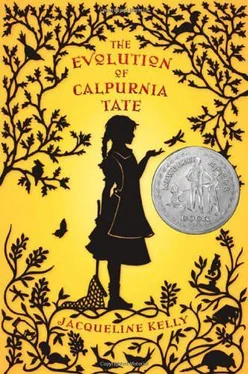Jacqueline Kelly - The Evolution of Calpurnia Tate
Здесь есть возможность читать онлайн «Jacqueline Kelly - The Evolution of Calpurnia Tate» весь текст электронной книги совершенно бесплатно (целиком полную версию без сокращений). В некоторых случаях можно слушать аудио, скачать через торрент в формате fb2 и присутствует краткое содержание. Город: New York, Год выпуска: 2009, ISBN: 2009, Издательство: Macmillan : Henry Holt and Company, Жанр: Детская проза, на английском языке. Описание произведения, (предисловие) а так же отзывы посетителей доступны на портале библиотеки ЛибКат.
- Название:The Evolution of Calpurnia Tate
- Автор:
- Издательство:Macmillan : Henry Holt and Company
- Жанр:
- Год:2009
- Город:New York
- ISBN:978-0-8050-8841-0
- Рейтинг книги:5 / 5. Голосов: 1
-
Избранное:Добавить в избранное
- Отзывы:
-
Ваша оценка:
- 100
- 1
- 2
- 3
- 4
- 5
The Evolution of Calpurnia Tate: краткое содержание, описание и аннотация
Предлагаем к чтению аннотацию, описание, краткое содержание или предисловие (зависит от того, что написал сам автор книги «The Evolution of Calpurnia Tate»). Если вы не нашли необходимую информацию о книге — напишите в комментариях, мы постараемся отыскать её.
The Evolution of Calpurnia Tate — читать онлайн бесплатно полную книгу (весь текст) целиком
Ниже представлен текст книги, разбитый по страницам. Система сохранения места последней прочитанной страницы, позволяет с удобством читать онлайн бесплатно книгу «The Evolution of Calpurnia Tate», без необходимости каждый раз заново искать на чём Вы остановились. Поставьте закладку, и сможете в любой момент перейти на страницу, на которой закончили чтение.
Интервал:
Закладка:
And there was my grandfather, adding his low baritone in sad, sweet harmony to the music, his long beard glinting in the firelight. We had been so close to missing each other, he and I. He had turned out to be the greatest gift of all.
Then the pots and pans died out, and the song ended. Everyone except for Mother and Father shuffled up to bed, leaving the two of them to sit up together awhile longer.
I put on my thickest red flannel nightie and dove into bed. Mercifully, SanJuanna had taken the chill off the sheets with a warming pan. I intended to lie there for a while and take stock of my life. That’s what you do at the end of the century, don’t you? But I think I actually fell asleep right away and only dreamed I was taking stock.
Chapter 28
1900
The action of climate seems at first sight to be quite independent of the struggle for existence; but in so far as climate chiefly acts in reducing food, it brings on the most severe struggle between the individuals. . . .
I AWOKE IN A gasping panic. There was something terribly wrong with the world, and I knew in my marrow that something dreadful had happened during the night. It took me several seconds to figure out exactly what was wrong: There was such a deep, unnatural silence in the house and outside my window that it felt like the whole world had packed up and stolen away in the night. Had it happened? Had the world come to an end? Should I fall to my knees and pray?
And the light was all wrong. The light edging around my curtains seemed not so much like light as its absence. Every object in my room had taken on a flat, grayish aspect.
And then Ajax barked, just once. The sound was reassuring, even though it was muffled and as flat as the light. My panic was somewhat subdued by the realization that my bladder was about to burst. I felt desperate to use the chamber pot, but first I had to face the hideousness that awaited outside. I considered this. Well, if you did have to face the hideousness, it was a lot better to do so with an empty bladder. On the other hand, the china chamber pot would be awfully cold. I weighed these things, groped under the bed for the pot, and did a fair job of balancing above the icy rim.
That was better. Now to the business of facing hideousness.
I stood resolutely before the window and put my shoulders back in good military posture, took a deep breath, and yanked the curtain aside.
And there it was: a perfect blanket of white covering the lawn, the trees, the road, as far as I could see, all absolutely unbroken, untouched, and still. Snow. It had to be snow.
The world hadn’t ended. It had just begun.
I looked around my room at my familiar things in the strange light: the hummingbird’s nest in its glass box, my red Notebook, my framed butterflies.
I put on my rabbit slippers and pulled my wool dressing gown over my nightie. I edged around the noisy floorboard in the middle of the room and opened my door as quietly as I could, but it creaked loudly in the cold. I waited to see if anyone stirred, but to my relief there was no sound. I wanted to be alone. I wanted this just for me.
I tiptoed down the stairs out the front door and stood on the porch, clutching my gown around me. The temperature amazed me. How could the world be this cold? I inhaled deeply, and the air felt like a dagger in my chest. My exhaled breath formed clouds in the air that disappeared before I could catch them in my hands. There was no noise except for the whoosh of my breathing and the rushing of my own heartbeat. There were no birds in the silvery sky, no squirrels in the trees, no possums. Where had all the abounding life gone? The lack of living things made the landscape both beautiful and menacing.
As I looked out, a young coyote came slowly out of the trees, delicately lifting and shaking each paw before gingerly putting it down again in the snow. Step, flick, pause . . . step, flick, pause. . . . There was an expression on its face of such great disgust that I laughed. Startled, it looked up and saw me on the porch, and then I swear it sneered at me. It turned slowly on the spot and went back into the trees the way it had come, trying to step in its own tracks, still step-flick-pausing as it went.
Well, if the coyote could walk in that stuff, I could too. I walked down the steps into the snow. It was not solid like ice, but puffy. It was not silent either, but compressed under my foot with a squeaky crunch. My feet were chilled immediately, and I slipped and almost fell, but no matter. I picked my way down the front steps and looked over my shoulder at my own tracks, which rapidly turned into shallow foot-shaped puddles of water. Ahead of me lay perfection. Could I stand it? Could I bear to mar it with my presence?
I could. I had to have this gift of the moment—this great gift of the new century—to myself for one more minute, a few more precious seconds, before the bustle and shouts and tracks of the others shattered it forever. Gathering up my gown, I ran down the curved drive as fast as I could, lurching and slipping and filled with joy. I knew I looked crazed but I didn’t care. I ran to the street, which was unmarked by any wagon wheel, then veered off and ran through the pristine brush toward the river. Here I came across a pecan tree downed by the snow, its raw, flesh-tinted core the only color in the otherwise black-and-white landscape.
I saw a few skittery tracks left by birds and other small creatures, no doubt as confused by this silent white world as I was. Of course they were confused; the last snow had been decades ago. If a finch lived for only two years, how could it pass along the idea of something it had never seen to the next generation? Did the word disappear from the finch language, from finch society? How could any species survive the snow if the word for it died out? The finch race, all the other races, would be unprepared. I would have to put out quantities of seed and suet, hay and ham, and in this way provide for all the links along the food chain.
My feet were turning into blocks of ice, and I realized I was exhausted. I turned and walked back toward the house. It was the first morning of the first day of the new century. Snow blanketed the ground. Anything was possible.
The house was beginning to show its usual signs of morning life. I saw my grandfather watching me from his upstairs window. He raised one hand to me in salute. I replied in kind. We stood that way for a moment. Then I ran for the warmth of our home.
Acknowledgments
I have, for the sake of fiction, taken some small liberties with Texas history, and I apologize to any reader who spots those places where I have played fast and loose with the facts. Also for the sake of fiction, I have taken liberties with the blooming season of certain plants and the taxonomy of the Vicia genus. I beg forgiveness of those botanists and horticulturists who know better. Any errors concerning scientific matters are entirely my fault.
Thanks to the following entities for their encouragement and support along the way: The Mississippi Review; the Texas Commission for the Arts; the Writers’ League of Texas; the Dallas Museum of Art.
Thanks to Barbara French of the Bat Conservancy, to Dr. Diana Sanchez-Bushong of Westlake United Methodist Church, and to Dr. Spencer Behmer of Texas A&M University for their expertise.
Special thanks to Lou Ann and Jim Bradley for the use of their cabin when I needed it; thanks to Professor Roberta Walker of the University of Texas at El Paso, who could teach a rock to write; to Lee K. Abbott and Grace Paley; to Shelley Williams Austin, Dr. Michael Glasscock, Karen Stolz, Roberta Preston Pazdral, Gerry Beckman, Robin Allen, and Katherine Tanney; thanks to Mike Robinson and his daughter Callie, and to Phil and Jeannie Tate for the name of our heroine. Thanks to the Fabulous Writers of Austin for their boundless support: Pansy Flick, Graciela Fleming, Nancy Gore, Gaylon Greer, Jim Haws, Cecilia Jones, Kim Kronzer, Laura van Landuyt, Diane Owens, and Lottie Shapiro. To Houston White, Dian Donnell, and Charlie Prichard for introducing me to the Old House; to the late John “Sandy” Lockett for the bat tale, which he swore actually happened to him at Scholz’s Garden in Austin (an unlikely story, yes, but he never gave me any reason to doubt him). To my early readers, Joe Kulhavy, Wayne Price, Roxanne Hale Drolet, Carol Jarvis, and Noeleen Thompson for their encouragement, along with my comadre, Val Brown, who teaches piano with kindness and encouragement and in no way resembles Miss Brown. To my agent, Marcy Posner, for plucking me from the hopper. To Laura Godwin, Noa Wheeler, Ana Deboo, Marianne Cohen, and everyone at Holt for making this a better book.
Читать дальшеИнтервал:
Закладка:
Похожие книги на «The Evolution of Calpurnia Tate»
Представляем Вашему вниманию похожие книги на «The Evolution of Calpurnia Tate» списком для выбора. Мы отобрали схожую по названию и смыслу литературу в надежде предоставить читателям больше вариантов отыскать новые, интересные, ещё непрочитанные произведения.
Обсуждение, отзывы о книге «The Evolution of Calpurnia Tate» и просто собственные мнения читателей. Оставьте ваши комментарии, напишите, что Вы думаете о произведении, его смысле или главных героях. Укажите что конкретно понравилось, а что нет, и почему Вы так считаете.












